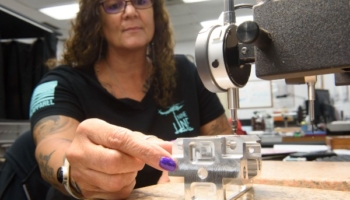2024 Manufacturing Forecast: 5 Sure Bets
U.S. manufacturing is on a winning streak, even as its success is challenging economic convention. How the newly energized sector co-exists with America’s powerful “import economy” is a topic of interest and intrigue in 2024.
- Tariffs are sustained. Other pro-manufacturing measures are stymied in ‘24
As fashionable as it’s become to be pro-manufacturing, America still has a love/hate relationship with its industrial base.
Tariffs exemplify our split-personality. The Wall St. Journal op-ed page speaks for powerful economic interests in opposing the Trump/Biden tariff regime, even as squaring this position with a pro-U.S. manufacturing platform is really hard.
Unless, voices like Harry Moser of the Reshoring Initiative argue, the cost of manufacturing in the U.S. can be lowered by 20-30%. But the means to get there — action to devalue the dollar, graduate more manufacturing employees, uptool thousands of SMBs, and reformulate trade policy to protect domestic industry – seem today, impossibly elusive.
In an election year lip-service will be paid to U.S. manufacturers and employees, but America’s “import economy” is still king. How manufacturing fares in advancing its fortunes, is the story of the year.
(More with Harry Moser next time.)
2. Brand power: Local manufacturers elevate their brands to win
Wagner Skis in Telluride, Colorado, has no business being successful. They compete with high-volume, low-margin producers that win on price, “buy” editorial coverage and big-name influencers utilizing fat marketing budgets, and generally operate from a different playbook than smaller, U.S.-manufactured producers.
Wagner Skis’ founder Pete Wagner isn’t fazed. “It’s not that we’re ‘Made in the U.S.,” Wagner says, “it’s that we’re an agile company – and we’re a real brand.” The take-away? “Business is really good.”
Brand-builders focus on the customer experience – the visceral, emotional connection that sustains through price wars, supply-chain woes, or unforeseen pandemics. To interact with the Wagner team will change your outlook on the sport and brands you patronize, generally.
“Real” brands will thrive in 2024. Including comeback brands like the Isuzu Trooper, bought and reimagined in ‘24 by a savvy OEM.
3. Space Command re-re-locates as workforce investments payoff
Space Command should never have been moved from Colorado to Alabama in the first place. That its final location is still in play is ridiculous.
That said, two developments will shape the final, final, final decision: neither Biden nor Trump will win the general election in 2024, and Alabama officials will pivot to find their way before Colorado’s do by linking manufacturing-related employment to the success of the overall space industry.
Alabama’s investment in its aerospace manufacturing workforce will be rewarded.
4. Five CHIPs Act-inspired Regional Innovation Hub winners are…
According to China’s president Xi Jinping, Taiwan’s reunification with mainland China is “inevitable.”
Trusting that smarter people than me are assessing the heightened risk of China controlling America’s top supplier of advanced semiconductors, I’ll guess that CHIPs-inspired programs like the Regional Innovation Hubs competition will prioritize U.S. semiconductor manufacturing – the OG CHIPs goal – including a new advanced manufacturing workforce and U.S. leadership in a new global energy paradigm.
We reported on the 31 finalists last year. My forecast of the five winners:
- Texoma Semiconductor Tech Hub
- Nevada Lithium Batteries and Other EV Material Loop
- American Aerospace Materials Manufacturing Tech Hub
- New Energy New York (NENY) Battery Tech Hub
- Corvallis Microfluidics Tech Hub
America’s national security is at risk. EDA: get it right.
- Twitter/X: the new voice of Musk’s Industrial Complex
Can Elon Musk be Henry Ford and William Randolph Hearst at the same time?
He should try. Elon Musk is the world’s most consequential industrialist – with a media bullhorn. In the 20th century, Hearst newspapers were a voice for The Chief’s personal and political agenda. If only he’d owned a U.S. satellite monopoly.
Speculate about its future, but know that in 2024, Twitter/X’s AI-fueled algorithm will promulgate Musk’s social and commercial narrative.
Twitter/X’s corporate evolution gains steam in ‘24.
Bart Taylor is a Manufacturing & Consumer Products BDE at Moss Adams and founder and former publisher of CompanyWeek manufacturing media. Reach him at bart.taylor@mossadams.com.



